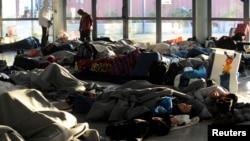Hundreds of migrants and refugees waited on Sunday in slow-moving queues at the border between Greece and Macedonia as heightened security measures put in place by Macedonia increased registration times.
All refugees entering Macedonia are now required to undergo a 30-minute interview at the border to prove their nationality, as Macedonia only permits refugees from Syria, Iraq and Afghanistan to continue their journey.
Those without valid travel documents, or documents suspected to be forged, and those who cannot document their country of origin would not be allowed through.
Some turned away
One woman, who a Reuters witness said police suspected of being an economic migrant from Morocco, was turned back.
Children warmed themselves by playing around a fire near rubbish bins as their parents, loaded with backpacks, waited in line.
A new, 37-kilometre fence is being erected at the border and 54 police officers from Slovakia and the Czech Republic have arrived to help the Balkan country control the influx of migrants attempting to reach rich northern European countries.
Once registered, refugees at the camp at Gevgelija wait to be put on a northbound train, of which there are two a day.
Strike actions on both the Greek side and the Macedonian side have caused a bottleneck of refugees in the camp, which can host up to 1,000. More than 2,500 were stuck there on Sunday.
"These couple of days the numbers of the refugees are increasing, not only because the more people are arriving, but considering the situation that we had strikes on the Greek side, the transportation has been stopped, and that is one of the purposes of the influx of refugees is growing these days," said Hana Habahbeh, a field coordinator for the United Nations refugee agency UNHCR.
False documents
Habahbeh added that the number of false documents was on the rise, hence the need for additional security.
"The measures are uprising in order to check the documents and everything because of the, as you know ... for the last couple months because of the stopping the influx of the refugees, it's only the three nationalities from Afghanistan, Iraq and Syria ... the police are having too many false documents, too many illegal migrants, that's why these cautions are taken these days," she said.
Younis, a Kurdish refugee from Iraq, said he understood that people's identification needed to be checked, but said the number of people in the camp was overwhelming.
"It's quite normal. For example when you want to go abroad legally, you need to go the embassy and stamp your passport. And all of the documentation is here. And just the problem here ... the huge number of refugees and it's a big problem, and for both the refugees and the staff," said Younis, who hopes to join his brother in Germany.
More than 1 million people fleeing poverty, war and repression in the Middle East, Asia and Africa reached Europe's shores last year, most heading for Germany. More than 62,000 arrived in Greece last month.





